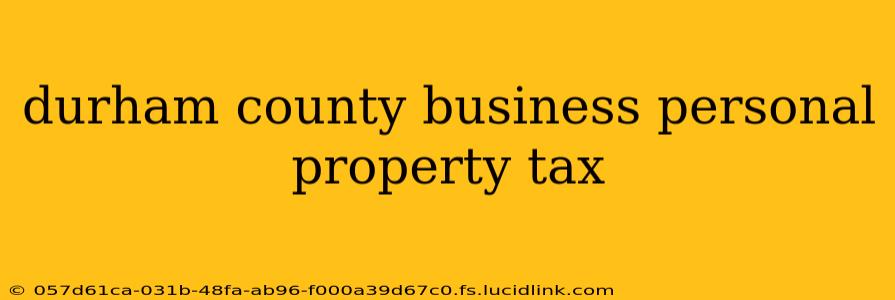Durham County, North Carolina, like many other counties, levies a tax on business personal property. This tax applies to tangible items owned by businesses and used for business purposes, but not real estate. Understanding this tax is crucial for business owners to effectively manage their finances and comply with local regulations. This guide provides a comprehensive overview of Durham County business personal property tax, addressing common questions and concerns.
What is Business Personal Property Tax?
Business personal property tax is an annual tax assessed on the value of tangible assets owned by a business and used for its operations. This includes a wide range of items, from computers and furniture to machinery and vehicles. Unlike real estate property tax, which taxes land and buildings, this tax targets the movable assets integral to a business's functioning. The tax is levied by Durham County and the revenue generated contributes to funding essential county services.
What types of property are taxed in Durham County?
Durham County's business personal property tax encompasses a broad range of assets. Here are some examples:
- Office Equipment: Computers, printers, copiers, desks, chairs, and filing cabinets.
- Manufacturing Equipment: Machinery, tools, production lines, and specialized equipment.
- Vehicles: Cars, trucks, vans, and other vehicles used for business purposes.
- Inventory: While the treatment of inventory can be complex and may vary by industry and business structure, it's essential to understand the relevant regulations.
- Furniture and Fixtures: Items used to furnish and equip the business premises.
It's crucial to note that the exact types of property subject to tax and the specific valuation methods can be complex. Consulting with a tax professional familiar with Durham County regulations is strongly advised for accurate assessment.
How is the value of business personal property determined?
The Durham County tax assessor determines the value of business personal property. This process often involves reviewing tax returns, business records, and potentially conducting physical appraisals. The valuation method may consider factors such as the age, condition, and market value of the assets. The assessed value is then multiplied by the applicable tax rate to determine the total tax owed. This assessment process is crucial; understanding how the valuation is determined allows businesses to identify potential issues and appeal if necessary.
What is the tax rate for business personal property in Durham County?
The tax rate for business personal property in Durham County varies year to year. It's essential to consult the Durham County Tax Assessor's office website or directly contact the office for the most up-to-date tax rate. This rate is applied to the assessed value of the property to calculate the final tax liability. Keeping abreast of these changes is crucial for accurate budgeting and financial planning.
How do I file my business personal property tax return in Durham County?
The Durham County Tax Assessor's office provides detailed instructions and forms for filing business personal property tax returns. Deadlines for filing vary, so it's critical to check the official website or contact the office to ensure timely submission. Failure to file on time may result in penalties and interest charges. Accurate and timely filing is essential for maintaining compliance and avoiding unnecessary financial burdens.
What are the penalties for late filing or non-payment?
Late filing or non-payment of Durham County business personal property tax results in penalties and interest charges. The specific amounts can vary, so it's crucial to review the information provided by the Durham County Tax Assessor's office to understand the consequences of non-compliance. Proactive tax management is key to avoiding these additional costs.
Where can I find more information about Durham County business personal property tax?
For the most accurate and up-to-date information, always consult the official website of the Durham County Tax Assessor's office. Their website usually includes detailed guides, forms, and contact information. They are the primary source for all questions and concerns related to this tax. Consulting a tax professional can also provide valuable guidance and support in navigating the complexities of this tax.
This guide provides a general overview. Always refer to official sources for the most current and accurate information. Proper understanding and timely compliance with Durham County's business personal property tax regulations are vital for responsible business ownership.
